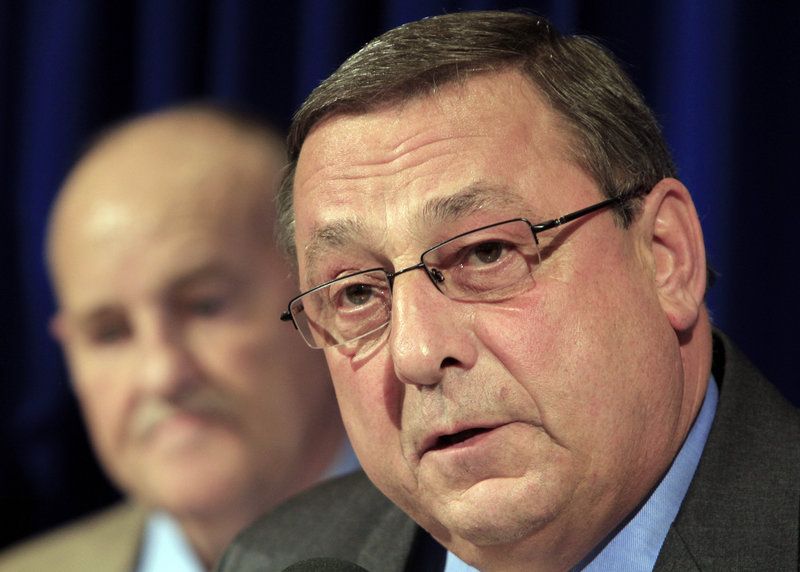Gov. Paul LePage has proposed zoning 10 million acres of northern Maine for development, repealing laws that require manufacturers to take back recyclable goods for disposal and reversing a ban on the use of a chemical linked to cancer in children’s products.
The proposals are among 36 sweeping changes to environmental laws that LePage sent to the Legislature’s new Joint Select Committee on Regulatory Fairness and Reform. The panel began a series of statewide public hearings on regulatory reform Monday in Presque Isle.
LePage’s submission ignited howls of protest from environmental groups, who had met with the governor in a forum Thursday to try to persuade him that environmental laws are good for the economy.
“We are shocked and stunned,” said Lisa Pohlmann, incoming executive director of the Natural Resources Council of Maine, one of the state’s largest and oldest environmental advocacy groups.
LePage’s proposals are based on a series of “red tape workshops” that the administration is holding with chambers of commerce to identify government rules that may dampen the state’s business climate.
His proposals are expected to provide a foundation for LD 1 – An Act to Ensure Regulatory Fairness and Reform, which will be handled by the new regulatory reform committee.
“Job creation and investment opportunities are being lost because we do not have a fair balance between our economic interests and the need to protect the environment,” LePage said in a written statement accompanying the list.
The notion of opening 10 million acres of northern Maine to development stems from proposals aimed at the Land Use Regulation Commission, the planning and zoning agency for the state’s unorganized territories. LePage’s proposal calls for not less than 30 percent of the commission’s jurisdiction to be zoned for development.
Also in LePage’s crosshairs is the state’s new product stewardship law, passed unanimously in the last session of the Legislature. That measure creates a process for identifying consumer products for which manufacturers would have to create recycling or take-back programs.
The governor wants to revise the law so that “manufacturers do not have to pay to recycle their consumer products,” and so the standards don’t exceed those set in federal law.
LePage also wants to reverse a vote taken by the state Board of Environmental Protection to phase out the use of bisphenol A in children’s products, and rely instead on federal standards. The chemical is a plastic hardener, used in food containers, baby bottles and cups, that has been linked to cancer, obesity and learning disabilities. The BEP vote awaits authorization by the Legislature.
Some of the governor’s other proposals for environmental reform include:
• Making Maine’s environmental laws conform to less stringent federal standards.
• Requiring a cost-benefit analysis for all rulemakings.
• Relaxing air emissions removal standards, especially for smaller projects.
• Replacing the BEP with a system of administrative judges who would hear appeals of state Department of Environmental Protection staff decisions.
• Allowing vertical building additions on sand dunes whether or not the entire building is on posts.
• Requiring the DEP to act within 30 days of receiving applications for site development permits.
Environmental groups responded to the release of the list by calling on their memberships to protest the changes at the regulatory reform committee hearings.
Although LePage has clearly signaled his intent to redress a perceived imbalance between economic development and environmental protection, many environmental leaders said they were still taken aback by the breadth and scope of his agenda.
“I was quite surprised at the length of the list,” said Landis Hudson, executive director of Maine Rivers.
Sean Mahoney, executive director of the Maine Conservation Law Foundation, said some of LePage’s proposals may not be legal.
“From a legal standpoint, we don’t think the proposals would pass muster – for example, changing the standards for review for agencies,” Mahoney said.
LePage is expected to release separate lists for other policy areas, such as health care and taxes, in the weeks ahead, although it is not clear when, said Dan Demeritt, the governor’s spokesman.
Demeritt said the proposals reflect LePage’s desire for attitudinal changes in regulatory agencies, such as the DEP.
Pohlmann, at the Natural Resources Council of Maine, said the proposals go much further than creating a friendlier business climate.
“This is an ideological push rather than a reasoned, science-based approach,” she said.
Staff Writer Beth Quimby can be contacted at 791-6363 or at: bquimby@pressherald.com
Send questions/comments to the editors.





Success. Please wait for the page to reload. If the page does not reload within 5 seconds, please refresh the page.
Enter your email and password to access comments.
Hi, to comment on stories you must . This profile is in addition to your subscription and website login.
Already have a commenting profile? .
Invalid username/password.
Please check your email to confirm and complete your registration.
Only subscribers are eligible to post comments. Please subscribe or login first for digital access. Here’s why.
Use the form below to reset your password. When you've submitted your account email, we will send an email with a reset code.